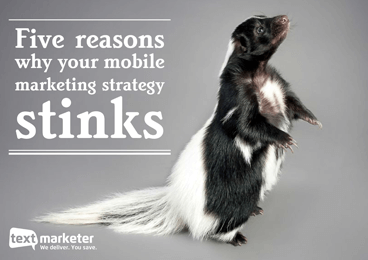This subject needs no further explanation.
1. You haven’t really got a mobile marketing strategy
That sounds a trifle patronising but the reality is that the vast majority of UK companies don’t really get involved in mobile marketing in any meaningful way. We estimate that around two thirds of companies remain stubbornly in denial of the meteoric rise of the mobile phone and all its wonders and frustrations. The mobile has genuinely changed the way that we all interact and communicate and now accounts for an ever increasing slice of digital spend.
To us, it seems somewhat baffling that most companies seem to ignore the mobile phone and continue to battle away at more familiar and safer feeling marketing channels. Enough of the ranting, the simple point to make is that most companies don’t do mobile.
2. It’s not joined up
Those companies that have got involved in mobile marketing have mainly seen it as an add-on, a kind of optional extra to their main marketing stuff. Any mobile activity is often run in a vacuum and doesn’t link in any way to existing campaigns. For example, many companies will have tried sending a bulk SMS campaign in an effort to increase sales. So the marketing team will have come with an offer, compressed it to 160 characters and sent it out the door. So the customer receives a text out of the blue with no detail and no additional support material.
We’ve checked and over 95% of marketing bulk SMS campaigns do not contain a link to a mobile optimised website. Even worse, of those that do send a text containing a link, 72% of companies include a URL taking the user to a non-mobile optimised site. The eager customer clicks on the link and then waits minutes for a site to load, or more realistically, rolls their eyes and clicks away.
3. It’s a flash in the pan
Many companies see mobile as a dangerous experiment; to be tried once or twice and unless it produces outstanding results, to be quietly filed away in the ‘we gave it a try’ folder. The trouble with that approach is that all consumers are not doing the same thing with their mobiles, quite the reverse in fact. We are all spending more and more time fiddling (often rather aimlessly) with our phones. So companies that choose not to interact with their customers via mobile will not only miss out on a tremendous opportunity but risk alienating themselves.
As with any marketing strategy you need to persist. A single bulk SMS does not a campaign make. Companies need to decide to embrace all elements of it, devise a long-term plan and stick to it.
4. It’s one dimensional
When most people think of mobile marketing, one thing usually leaps to mind; bulk SMS. Bulk SMS is just one of the tools in the metaphorical box that marketing departments should be considering. If you are going to take mobile marketing seriously then you need to be looking at a much wider range of ways to interact with customers. So here’s a quick run through some of the key elements that need to looked at.
Bulk SMS – Communicate news and offers to customers, prospects and staff.
Text Response – Allow customers to respond to marketing by text. E.g. ‘Text OFFER to 88802’.
QR Codes – Take customers to rich web-based content directly from your advertising.
Mobile Optimised Website – Vital. Allow customers to use your website on the move.
Mobile Payments – Allow you customers to purchase directly from the mobile site
Opt in and preferences – Capture customer and ask how they would like to receive info from you.
Opt out – Operate a rigorous unsubscribe policy. Make it easy for people to get off your list.
5. You’re half convinced that mobile is a fad.
Stan at Velocity Partners put this brilliantly. “Mobile is the juggernaut that we’re all trying very hard to pretend we don’t see.” But it’s no use, mobile is not going away, it’s actually becoming more and more important. So the time has come to embrace it, plan a detailed strategy and implement it ahead of your competitors. It needn’t be horribly expensive or suck up too much valuable time. I fear that companies that ignore it will regret it sooner rather than later.


